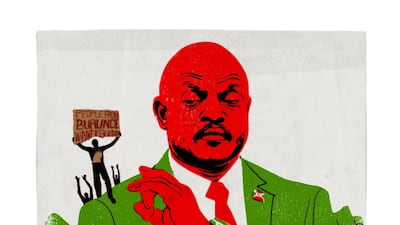Burundi is on the boil. Ethnic violence began to abate in the landlocked central African state – one of the world’s poorest – only in 2000, when a complex peace deal brokered by Nelson Mandela helped end a civil war that ultimately devoured 300,000 lives.
The country’s transformation thereafter from a fractured ethnocracy into a functioning democracy was rapid. That astonishing achievement has, alas, become a casualty of Pierre Nkurunziza’s seeming thirst for power.
Elected to the presidency in 2005 by parliament, Mr Nkurunziza decided last year to seek, in defiance of constitutional limits, a third term in office. It triggered major protests; a coup attempt, led by a fellow Hutu, Gen Godefroid Niyombare; and severe reprisals by forces loyal to the government.
The constitutional court ultimately approved Mr Nkurunziza bid for a third term – a day after the court’s vice president fled the country and alleged that the president had threatened the judiciary. Many of Mr Nkurunziza’s opponents escaped the country and formed a resistance movement in Addis Ababa.
Burundi was plunged into political turmoil. It has not recovered since. Last month, three military installations in the country’s capital, Bujumbura, were attacked by anti-Nkurunziza forces. Retaliatory violence continues to claim lives. Dozens of men have been executed in operations carried out by pro-government forces. A disturbing recent report by Amnesty International records the savagery in Bujumbura: “Men were taken out of their homes and shot at close range, or even killed inside them, the instant their doors were opened”. Streets, houses and drainage ditches were strewn with bodies. “In three locations, there were large pools of blood where the victims had been killed.”
Mr Nkurunziza promotes himself to the world as a devout Christian. His entourage includes a Christian choir and a football team, Hallelujah 11. In the beginning, he seemed to embody his country’s finest virtues. A former Hutu rebel from a politically powerful family, he made a conscious effort to transcend ethnic boundaries. He championed reconciliation and honoured the constitution by appointing Tutsis and women to important governmental posts. But his idealism could not survive exposure to power. As Nigel Watt explains in a forthcoming revised edition of Burundi: The Biography of a Small African Country, once Mr Nkurunziza “was in the presidential chair he began to grow in confidence, self-assurance and eventually arrogance”.
His political party began a purge of members who were critical of the president. Not even those who had played a key part in Mr Nkurunziza’s elevation to the presidency were spared. Intellectuals and political dissidents have left the country. Those who have cheered on the president have grown unaccountably rich.
Mr Nkurunziza’s second term in office coincided with the growing clamour in Africa for democracy. He could have joined the luminous ranks of Africa’s greatest statesmen had he vacated Burundi’s presidency after serving his two terms. He might have fortified Burundi’s democratic institutions and his reputation would have been instantly repaired.
The fact that the coup against Mr Nkurunziza was launched by a fellow Hutu is the clearest sign this is not an ethnic crisis. There is no certainty, however, that it will remain this way.
Like rebels everywhere, the opposition to the president – pluralistic as of now – wants to draw attention to its cause by engineering chaos in the country. When assaults on state assets are launched, the government reacts with incommensurate force and footage of the ensuing violence is shopped around the world to incite foreign intervention.
Mr Nkurunziza is insuring himself against the last possibility by provoking ethnic tensions. Although the opposition to his rule is not communitarian, his forces have targeted a disproportionately large number of Tutsis. Mr Nkurunziza is poised to morph into the role of the defender of Hutu interests.
Some are rushing to hand him that opportunity.
Rwanda’s reported drive to recruit anti-Nkurunziza fighters from the 70,000 Burundian refugees on its soil can only make matters worse. Paul Kagame, the president of Rwanda, rejects the allegations – but the US-based advocacy group Refugees International has collected enough testimonies from Burundian refugees to substantiate them.
For all Mr Nkurunziza’s ills, he enjoys significant pockets of support in rural Burundi. Mr Kagame, on the other hand, can scarcely be said to be better than Mr Nkurunziza.
As documented by Anjan Sundaram in his new book Bad News: Last Journalists in a Dictatorship, Kagame’s Rwanda is as infernal for journalists and activists as Nkurunziza’s Burundi. The inference here is that Mr Kagame, who has successfully amended Rwanda’s constitution to seek a third term as president, is an unreliable character. If a large scale eruption of ethnic violence is to be averted, it would be best to keep Kagame out of Burundi’s affairs.
Members of the UN Security Council have arrived in Burundi. Their visit may be accompanied by heightened violence.
The opposition believes it will benefit from chaos. But to succumb to the demands to push Mr Nkurunzuza out of power will only prompt the president to assume even more extreme postures.
Balance, or the appearance of it, is indispensable.
Condemnations of violence by Mr Nkurunziza’s forces should be preceded by severe rebukes of those directing assaults on Burundi’s military installations from abroad.
Western aid accounts for half of Burundi’s budget. That is tremendous leverage – and the immediate priorities of the donors should be: disbanding the president’s militia, removing restrictions on the press and nudging Mr Nkurunziza towards an honourable exit.
Liberal democracy cannot be imposed on Burundi by foreigners: that is a job for Burundians themselves.
But outsiders can help forestall another crisis by creating, as Mandela did in 2000, the conditions for dialogue between warring parties.
Kapil Komireddi is a journalist in London

